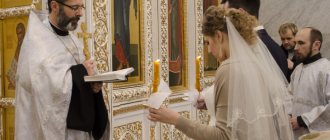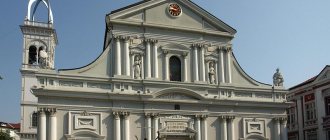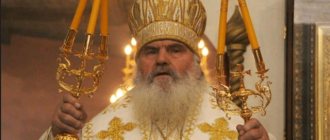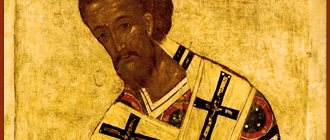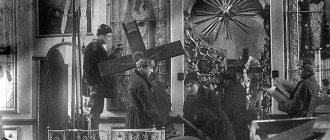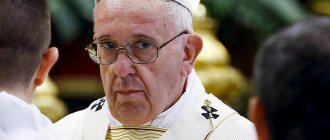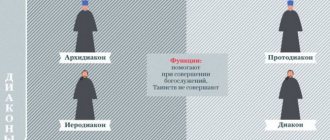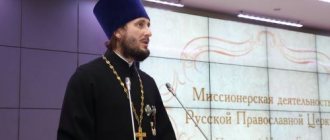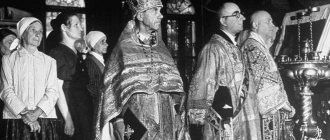Russian Orthodox Church
Permanent member of the Holy Synod of the Russian Orthodox Church
Born on September 16, 1968 in Luninets, Brest region. Belarus.
After graduating from secondary school No. 1 in Luninets in 1985, he entered the Belarusian State University at the Faculty of Radiophysics and Electronics. In 1987-89 served in the Armed Forces. Then he continued his studies at the university. In June 1992, he received a diploma in radiophysics engineer.
In August 1992, he entered the first year of the Minsk Theological Seminary. At the end of the third year of seminary in 1994, he submitted a petition and was accepted into the brethren of the Dormition Zhirovichi stauropegial monastery.
On December 16, 1994, in the Assumption Cathedral of the Zhirovichi Monastery, the abbot of the monastery, Archimandrite Gury (Apalko), with the blessing of Metropolitan Philaret of Minsk and Slutsk, was tonsured a monk with the name Veniamin in honor of the Hieromartyr Veniamin, Metropolitan of Petrograd and Gdov.
On January 9, 1995, during the Liturgy in the Assumption Cathedral of the Zhirovchi Monastery, Metropolitan Philaret of Minsk ordained him a hierodeacon, and on February 13, 1995, he was ordained a hieromonk.
On June 20, 1996, he was appointed to the position of treasurer of the monastery. In the same year, after graduating from the Minsk Theological Seminary, he entered the first year of the Minsk Theological Academy and was appointed to the position of teacher at the Minsk Theological Seminary. In 1999 he graduated from the Theological Academy with an academic degree of Candidate of Theology.
On December 14, 1999 he was elevated to the rank of abbot.
On January 12, 2005, he was appointed to the position of dean of the Zhirovichi monastery.
On May 20, 2006 he was elevated to the rank of archimandrite.
As part of the delegation of the Minsk diocese, he took part in the Local Council of the Russian Orthodox Church on January 27-29, 2009.
On July 1, 2009, he was relieved of his post as dean of the Assumption Zhirovichi Monastery and appointed to the position of abbot of the Annunciation Lyadensky Monastery of the Minsk Diocese.
By the decision of the Holy Synod of March 5, 2010 (magazine No. 10), he was elected Bishop of Borisov, vicar of the Minsk diocese.
He was consecrated bishop on March 20, 2010 in the cross church of the Patriarchal residence in the Danilov Monastery in Moscow. He was consecrated on March 21 during the Liturgy in the Cathedral of Christ the Savior in Moscow. The services were led by His Holiness Patriarch Kirill of Moscow and All Rus'.
By the decision of the Synod of the BOC on June 4, 2010 (magazine No. 120), he was appointed chairman of the Publishing Council of the Belarusian Exarchate.
By the decision of the Synod of the BOC dated June 26, 2014 (journal No. 33), he was appointed chairman of the newly formed Synodal Department of Religious Education and Catechesis and deputy chairman (journal no. 35) of the Church Court of the Belarusian Exarchate.
By the decision of the Holy Synod of October 23, 2014 (journal No. 93), he was appointed Bishop of Borisov and Maryinogorsk.
By the decision of the Synod of the BOC on November 19, 2014 (journal No. 55), he was included in the Synod of the Belarusian Exarchate with voting rights.
By the decision of the Synod of the BOC on June 3, 2015, he was removed from the membership of the Church Court (journal No. 13), relieved of the post of abbot of the Annunciation Lyadensky Monastery of the Minsk Diocese (magazine No. 15) and chairman of the Publishing Council of the Belarusian Exarchate (magazine No. 18).
By the decision of the Holy Synod of August 25, 2022 (journal No. 46), he was appointed Metropolitan of Minsk and Zaslavl, Patriarchal Exarch of All Belarus, while maintaining temporary control of the Borisov diocese.
On September 6, 2022, during the Liturgy in the Cathedral of Christ the Savior in Moscow, His Holiness Patriarch Kirill elevated him to the rank of metropolitan.
By the decision of the Synod of the BOC dated September 29, 2022 (journal No. 29), he was relieved of the post of chairman of the Synodal Department of Religious Education and Catechesis of the Belarusian Exarchate.
By the decision of the Holy Synod of June 9, 2022 (magazine No. 27), temporary management of the Slutsk diocese was entrusted.
Veniamin Kaverin
Role and place in literature
Veniamin Aleksandrovich Kaverin, a famous Soviet writer, playwright and screenwriter, has gone through a long and fruitful creative path.
He witnessed the most tragic and turning points of his homeland, which appreciated his talent and contribution to the development of literature, awarding him the Order of Lenin and the Red Banner of Labor. The name of the writer is inextricably linked with the theme of science and with the theme of the appearance on the arena of a new type of Soviet person - a talented, enthusiastic, determined and persistent young citizen. It is no coincidence that the motto of the heroes of his famous novel became the words: “Fight and search, find and not give up!”
Veniamin Kaverin managed to uniquely combine two genres into one - socio-psychological and adventure. The language of Kaverin’s works is not particularly colorful; on the contrary, it seems a little dry and stingy, but this does not prevent him from giving the impression of artistic lightness and grace.
Childhood
Kaverin often uses the intonations of ordinary speech, filling it with expressive pauses, which also carry an emotional connotation. Importance is attached to the rhythm and intonation of each dialogue and each phrase. Because of his ability to depict the subtlest human emotions with a pen, the author was called not only a good writer, but also an excellent psychologist.
The works of Veniamin Kaverin continue to be read to this day. They are also interesting because the author often took some historical event or fact as the basis for the story. So, through the prism of history, he conveyed his feelings and thoughts to readers, and almost always these thoughts turned out to be very important.
Unfortunately, Kaverin can be called an underappreciated writer. Many of his works, especially those written in his mature creative age, remained in the shadow of the famous “Two Captains”.
Origin and early years
Veniamin Zilber (real name of the writer) was born in Pskov, April 19, 1902. Father, Abel Abramovich, was a musician and served as a regimental bandmaster, rehearsing army marches with an orchestra for days. Mother, Khana Girshevna, was also a musically gifted person. At one time, she graduated from the Moscow Conservatory and gave piano lessons, thereby supporting the shaky family budget.
Youth
Benjamin was the youngest of six children. According to his recollections, their family was complex and unfriendly, but, in its own way, beautiful and significant in their city.
The lack of mutual understanding and comfort was compensated by the children’s talent, hard work, and love of reading. The family actively participated in the life of the city. On Sundays, my father’s orchestra played in the park for the townspeople, and in the evenings the household gathered around the table to discuss the latest news in cultural life and share their impressions.
The family usually spent the summer at a rented dacha in Chernyakovitsy, in a huge, old house ready to fall apart, which was given the nickname “Noah’s Ark.” The writer recalled: “I was amazed by everything - the change of day and night, and walking on my feet, while it was much more convenient to crawl on all fours, and closing my eyes, which magically cut off the visible world from me. The frequency of meals struck me – three or even four times a day? And so all your life? With a feeling of deep surprise, I got used to my existence - it’s not for nothing that in childhood photographs my eyes are always wide open and my eyebrows are raised.”
Education
In 1912, Veniamin became a student at the local gymnasium. Kaverin acted hard - his humanitarian mindset could not overcome the arithmetic exam, and as a result he failed twice. I managed to get in only the third time. But the six years spent at the gymnasium turned out to be very eventful and bright. Veniamin was an active participant in all events of gymnasium life, and in 1917 he became a member of a democratic society.
"Serapion Brothers"
In the winter of 1918, the Germans entered the city. Kaverin wrote in his memoirs: “The Germans seemed to have slammed the door behind my childhood.” Reading saved me from harsh reality. Young people - students, seminarians, realists - entered into heated debates about the works of Kuprin, Gorky, Andreev. Veniamin’s authority was the future famous prose writer, the husband of his sister Elena, Yuri Tynyanov, who criticized his first children’s poems. Despite this, it was from Tynyanov that Veniamin heard advice to engage in literary creativity.
In 1919, Kaverin and his brother went to Moscow. Veniamin became a student at Moscow University. In 1920, he transferred to the University of Petrograd and in the same year became a student at the Institute of Oriental Languages.
Creation
The writer borrowed the pseudonym Kaverin from his friend A.S. Pushkin, whose image under this name appeared in the novel “Eugene Onegin”. With the real Kaverin, a hussar and a duelist, Veniamin had in common his directness and rejection of any compromises.
Kaverin’s work began with meeting poets, trying to rhyme, and participating in seminars. When the House of Writers announced a competition, he dared to submit his story “The Eleventh Axiom” and, unexpectedly for himself, received a prize for it. This first work was noted by M. Gorky.
The writer's wife Lydia
After some time, Benjamin became a member of the Serapion Brothers literary community. Its members were M. Zoshchenko, V. Ivanov, K. Fedin and other writers. Writers called Kaverin “Brother Alchemist” for his exorbitant passion for style and for his love and craving for plot.
In 1922, Kaverin married Yuri Tynyanov’s sister, Lydia. This was the only, long and happy marriage in the writer’s life. The couple raised two children - son Nikolai and daughter Natalya.
In 1923, the young writer’s first book of stories, Masters and Apprentices, was published. Gorky's praise was expressed in the fact that he called Kaverin “a most original writer.” Being one of the best students, after graduating from university, Veniamin entered graduate school and brilliantly defended his dissertation in 1929.
The beginning of the thirties was marked by the appearance of Kaverin's plays, which replenished the repertoires of many theaters. The famous director V. Meyerhold even offered the writer constant cooperation, but he refused, opting for stories and novels.
Museum “Two Captains” in Pskov
In 1930, Kaverin's first three-volume work was published. Before the joy of this event had passed, the writer was accused of “thirst for bourgeois restoration” and called a “fellow traveler writer.” In those years, the reaction to such accusations had to be very balanced. This is what Kaverin did. He hid his pride deeply and wrote the novel “Fulfillment of Desires,” which he himself was skeptical about.
The next novel, “Two Captains,” was approved by Stalin himself. He was awarded a prize named after the Father of Nations. The most surprising thing was that in the novel, Kaverin never mentioned the party, the Komsomol, or the leader himself.
During the Great Patriotic War, Kaverin worked as a correspondent for Izvestia on the Leningrad Front and the Northern Fleet.
In 1946, writers M. Zoshchenko and A. Akhmatova found themselves in disgrace. At that time, many fellow writers turned away from them. Only Veniamin Kaverin’s attitude towards them remained the same, who provided them with every possible support, calling Zoshchenko the best writer of our time and helping him with money.
Sculpture “Two Captains” in Pskov
In 1947, Kaverin moved to Moscow. He settled in Peredelkino and began work on the novel “Open Book”. In 1948, the book was published and was very well received by the reader, in contrast to colleagues and critics who called this work hostile to the socialist system. But time did not stand still, changes took place in the country, and in 1956 the second volume of “Open Book” was published in “Literary Moscow”, without causing any hostile reaction.
In the sixties, Kaverin published articles calling for the rehabilitation of Mikhail Zoshchenko. In the seventies he defended Alexander Solzhenitsyn.
In 1972, the novel “Before the Mirror,” remarkable in its sincerity, was published, and in 1976 the story “Illuminated Windows” was published. Kaverin’s best works also include the magnificent fairy tales “Hourglass”, “Verlioka”, “Nemukhinsky Musicians”.
Despite the fact that the writer repeatedly stood up for his colleagues, he was not a dissident. His book “Epilogue,” written “on the table” in the seventies, was a scaffold both for the system and for the writers who caved in to it. Konstantin Simonov, Alexei Tolstoy, and Valentin Kataev were criticized on the pages of this work.
Since publication of the Epilogue in the USSR was impossible, it was proposed to publish the memoirs abroad. But Kaverin did not agree and handed over his manuscript to Vladimir Voinovich, who was once expelled from the Soviet Union. “Epilogue” was published in his homeland in 1989, the year of the death of the writer, who, nevertheless, managed to see the advance copy.
Major works
In 1944, the adventure novel “Two Captains” by V. Kaverin was published. It described the difficult fate of the main character, Sanya Grigoriev. An orphanage, a special school, a fateful meeting with Katya, the outbreak of war - all this happens in the fate of a young man who is in a hurry to grow up and get to know this world. Having fulfilled her dream of becoming a military pilot, Sanya manages to unravel the secret of Captain Tatarinov hidden under a layer of polar snow.
Writer's grave
The novel “Open Book,” published in 1956, tells the story of a young scientist, microbiologist Tatyana Vlasenkova. The reader traces the difficult path of the heroine, which she overcomes with courage for the sake of a scientific discovery that is very important for the development of medicine.
In 1972, the novel “Before the Mirror” was written, which connoisseurs of Kaverin’s work call his best book. At the center of the novel is the story of the relationship between Kostya Karnovsky and Liza Turaeva, who happened to meet at a ball. Fate rarely gave them meetings, but for the next twenty years, Lisa, wherever she was, sent letters either to her lover, or then just to a friend.
Last years
Writer V.A. Kaverin lived a long life and did not give up his work until the end. He still had a lot of plans ahead, which he did not have time to implement. His last book was dedicated to Yuri Tynyanov, with whom the writer had many years of friendship.
In recent years, Kaverin lived in the writer's village of Peredelkino near Moscow. His latest works were published periodically. Veniamin Alexandrovich died on May 2, 1989. The writer's grave is located at the Vagankovskoye cemetery.
Chronological table (by date)
| Year(s) | Event |
| 1902 | Year of birth V.A. Kaverina |
| 1912-1918 | Years of study at the gymnasium |
| 1919 | Admission to Moscow University |
| 1920 | Transfer to Petrograd |
| 1921 | Joining the Serapion Brothers community |
| 1923 | Release of the collection “Masters and Apprentices” |
| 1925 | Release of the novel “The End of Khaza” |
| 1931 | Release of the novel “Artist Unknown” |
| 1936 | Release of the novel “Fulfillment of Desires” |
| 1944 | Publication of the last part of the novel “Two Captains” |
| 1956 | Release of the “Open Book” trilogy |
| 1962 | Publication of the story “Seven Evil Couples” |
| 1968 | Release of the story “School Play” |
| 1972 | Release of the novel “Before the Mirror” |
| 1976 | Publication of the story “Illuminated Windows” |
| 1982 | Release of the fairy tale “Verlioka” |
| 1989 | Release of memoirs “Epilogue” |
| 1989 | Veniamin Aleksandrovich Kaverin passed away |
Interesting Facts
- during his years at the gymnasium, Kaverin’s biggest problem was mathematics;
- young Benjamin's favorite writer was Stevenson;
- Veniamin broke up with poetry after criticism from Mandelstam and Shklovsky;
- The group “Serapion Brothers” had a huge influence on the writer’s skill;
- in 1958, Kaverin, the only one of all who did not participate in the persecution of B. Pasternak;
- the best novels by V.A. Kaverin's films have been filmed several times.
Memory of the writer
The asteroid Veniakaverin was named in honor of V. A. Kaverin.
The monument “Two Captains” was erected in a park in Pskov.
The Pskov children's library is named after V.A. Kaverina.
In Polyarny, Murmansk region, there is the Square of “Two Captains”.
Link
https://www.kaverin.ru/dva-kapitana/muzej/2289-muzej Museum of Veniamin Kaverin
